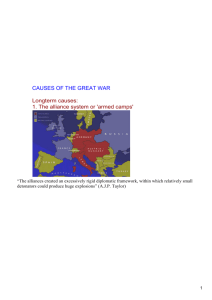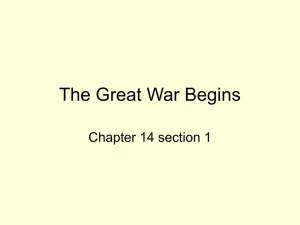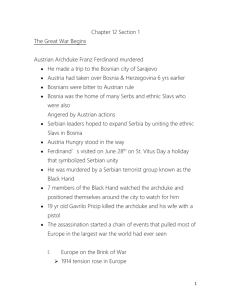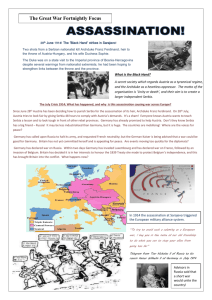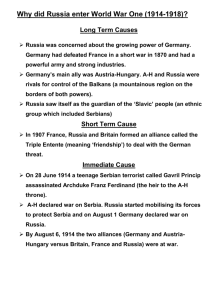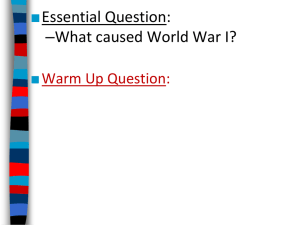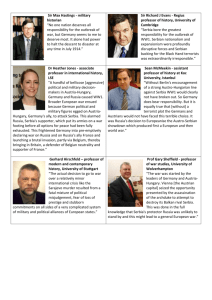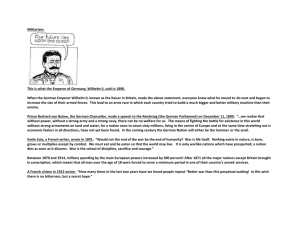World War I:
advertisement
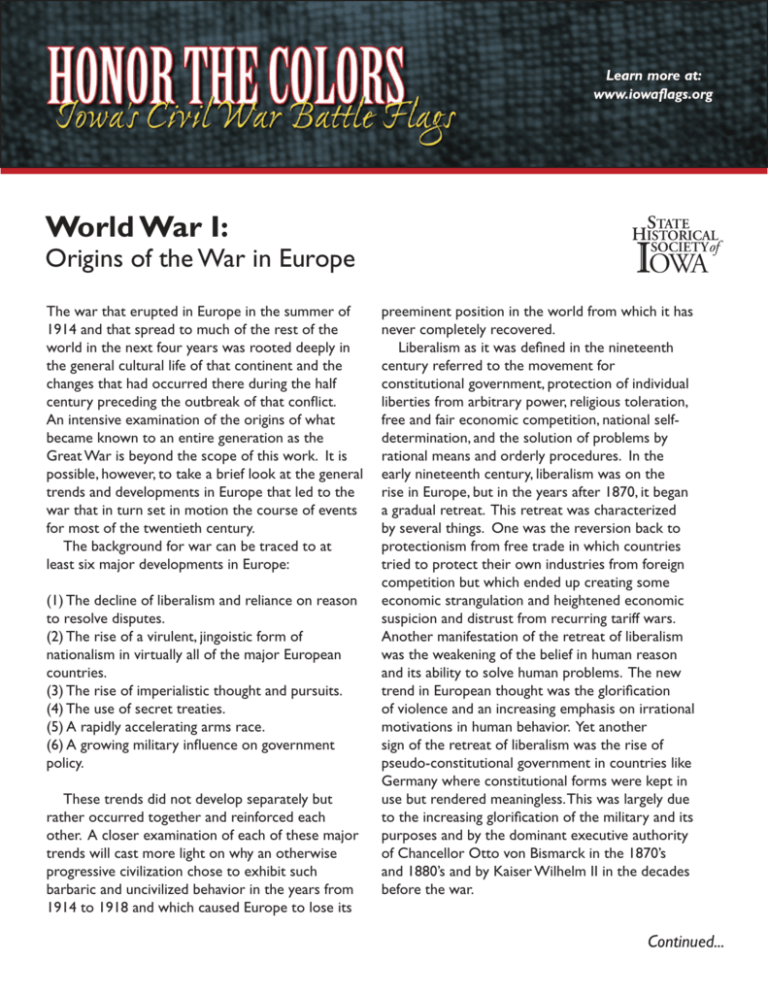
Learn more at: www.iowaflags.org World War I: Origins of the War in Europe The war that erupted in Europe in the summer of 1914 and that spread to much of the rest of the world in the next four years was rooted deeply in the general cultural life of that continent and the changes that had occurred there during the half century preceding the outbreak of that conflict. An intensive examination of the origins of what became known to an entire generation as the Great War is beyond the scope of this work. It is possible, however, to take a brief look at the general trends and developments in Europe that led to the war that in turn set in motion the course of events for most of the twentieth century. The background for war can be traced to at least six major developments in Europe: (1) The decline of liberalism and reliance on reason to resolve disputes. (2) The rise of a virulent, jingoistic form of nationalism in virtually all of the major European countries. (3) The rise of imperialistic thought and pursuits. (4) The use of secret treaties. (5) A rapidly accelerating arms race. (6) A growing military influence on government policy. These trends did not develop separately but rather occurred together and reinforced each other. A closer examination of each of these major trends will cast more light on why an otherwise progressive civilization chose to exhibit such barbaric and uncivilized behavior in the years from 1914 to 1918 and which caused Europe to lose its preeminent position in the world from which it has never completely recovered. Liberalism as it was defined in the nineteenth century referred to the movement for constitutional government, protection of individual liberties from arbitrary power, religious toleration, free and fair economic competition, national selfdetermination, and the solution of problems by rational means and orderly procedures. In the early nineteenth century, liberalism was on the rise in Europe, but in the years after 1870, it began a gradual retreat. This retreat was characterized by several things. One was the reversion back to protectionism from free trade in which countries tried to protect their own industries from foreign competition but which ended up creating some economic strangulation and heightened economic suspicion and distrust from recurring tariff wars. Another manifestation of the retreat of liberalism was the weakening of the belief in human reason and its ability to solve human problems. The new trend in European thought was the glorification of violence and an increasing emphasis on irrational motivations in human behavior. Yet another sign of the retreat of liberalism was the rise of pseudo-constitutional government in countries like Germany where constitutional forms were kept in use but rendered meaningless. This was largely due to the increasing glorification of the military and its purposes and by the dominant executive authority of Chancellor Otto von Bismarck in the 1870’s and 1880’s and by Kaiser Wilhelm II in the decades before the war. Continued... Learn more at: www.iowaflags.org World War I: Origins of the War in Europe (continued) Nationalism had been linked originally to liberalism as a means of fighting the reactionary forces of local nobles and their narrow particularistic interests. Nationalists, such as in Germany and Italy, believed that unifying their nations would create material improvement and a better life for much larger numbers of their citizens. They also believed that national unity would lead to the realization of the liberal ideas of constitutional government and individual rights for all citizens. In addition, they believed that unifying the nations of Europe would create a more stable and peaceful international order than what existed under the old order. After the unification of Italy in the 1850’s and Germany in the 1860’s, however, the development of nationalism began to take a more ominous turn. Instead of being a means to progressive ends, the cause of the nation gradually became an end in itself. In all the major European countries and even most of the smaller ones, the primacy of the nation gradually became so important that its interests had to be upheld at all costs including war. This change in the nature of nationalism began to uncouple it from liberalism. In this atmosphere, liberalism declined while nationalism grew in strength and intensity and eventually began to spawn racial ideologies that culminated after World War I in various fascist movements generally throughout Europe but especially with Nazism in Germany. In a sense, nationalism became the secular religion of Europe in the years after 1870 as a replacement for organized Christianity which had already been declining in influence for several centuries. Europeans gradually adopted an increasingly romanticized view of the nation and saw it as the most venerable institution of all. Death on the battlefield for the national cause was now seen as the most glorious form of public service and self-sacrifice. Starting in the 1870’s, many European countries engaged in a race to establish colonies in underdeveloped areas of the world, such as in Africa, the southwest Pacific, and in East Asia. This trend toward imperialism was encouraged by several factors. One was the growing maturity of European industry which brought on the need for new markets and new sources of raw materials. Another factor was economic hard times in the 1870’s and 1880’s which encouraged working class people to give business interests political support in their search for these new markets and new sources of raw materials. Trade protectionism and increasing distrust between nations also encouraged the race for colonies. As the pursuit of empire building proceeded, it created more and more clashes between the European powers and with the native peoples they were trying to intimidate into colonial submission. By 1905, however, all the major European powers, i.e., Britain, France, Germany, Italy, Spain, and Russia, had suffered at least one major military or diplomatic defeat in the course of empire building. While this stanched the flow of imperialistic expansion, it only exacerbated the already growing mutual suspicion and distrust of one another. Also, while imperialistic expansion began to subside by about 1905, the burdens of imperial administration continued to create Continued... Learn more at: www.iowaflags.org World War I: Origins of the War in Europe (continued) diplomatic problems between the powers right up to 1914 and also created conflicts with the colonies themselves until well after World War II. The foregoing developments also led to the use of secret treaties. These treaties created a situation in which every country became fearful of losing allies and becoming isolated and surrounded by enemies. For example, in 1890, when Germany ended its alliance with Russia in favor of one with Austria-Hungary, a whole new alignment of alliances occurred as Russia established a new alliance with France. When the French eventually linked up diplomatically with Britain, Russia felt compelled to join the British also, especially after losing a war with Japan in 1905. This fear of isolation also allowed the most irresponsible members of each alliance to control the alliance. During the final crisis in 1914, Germany could not restrain the irresponsible elements in either its own government or the Austrian government while the British and French were unable to restrain the irresponsible elements in the Russian government. All these trends led to an accelerating arms race among the major European powers. Virtually all of them tripled their military spending between 1870 and 1914, with an acceleration beginning about 1900 and increasing in particular between 1910 and 1914. Germany challenged Britain to a naval arms race while all countries produced new ships, new guns, and new battalions. The growing arms race led to rising military influence on government policy decision making. Civilian political leaders listened more and more to advice from their military and naval officers. Sometimes strong military personalities overrode civilian authorities as was the case with Field Marshal Conrad von Hotzendorf in Austria and Grand Admiral Alfred von Tirpitz in Germany. Civilian authorities, such as Russian foreign minister Alexander Izvolsky and Austrian foreign minister Count Aehrenthal, allowed themselves to be overcome by the increasingly militaristic mentality in policy making and drove their policy making in riskier and more dangerous directions. This in turn led to a series of localized wars in the Balkans in southeastern Europe starting in 1908. Although these wars were resolved by the diplomats, every succeeding conflict wore down the morale of the diplomats and increased the fighting spirit of the soldiers and the military establishments. By the spring of 1914, Europe was a powder keg that was ready to be lit. Then on June 28, the Austrian heir apparent, Franz Ferdinand, and his wife were assassinated in Sarajevo, the capital of Bosnia, a politically unstable province of the Austro-Hungarian Empire, by Gavrilo Princip, a young extreme Serbian nationalist. There had been considerable friction between Austria and Serbia for years, and the Austrian government used the assassination as an excuse for extreme action against the Serbs. After receiving an essentially “blank check” from Germany to take any action they pleased, Austria sent an ultimatum to Serbia on July 23 with demands that would have effectively ended Serbia’s national sovereignty. Russia, Serbia’s major ally in the region, had been counseling moderation and restraint. However, on receipt of news of the ultimatum, political momentum in the Continued... Learn more at: www.iowaflags.org World War I: Origins of the War in Europe (continued) Russian government shifted from the moderates to the militarists and the country began to prepare for war. Serbia responded to the Austrians by accepting almost all the terms of the ultimatum, but Austria declared their response to be unsatisfactory and declared war on July 28. Now the system of secret treaties came into play and worked its deadly effect. Like a chain reaction each major power was pulled into the conflict, and in just one week they were all at war. Austria’s declaration of war against Serbia only stimulated Russian mobilization. Germany sent a formal demand to Russia to stop its mobilization. When Germany received no reply, it declared war on Russia on August 1. Knowing that France would enter the war as Russia’s ally, the Germans decided to strike quickly against them. They used a plan developed by General Alfred von Schlieffen some years before in which Belgium was invaded as a means to outflank and encircle the French. This violation of Belgium’s neutrality on August 3 helped to trigger a British declaration of war on Germany on August 4. For the first time since the days of Napoleon a century earlier, Europe was now involved in a general war. Although few could have suspected it in the war enthusiasm of the moment, this would be the deadliest and most destructive conflict in Europe since the religious wars of the seventeenth century.
